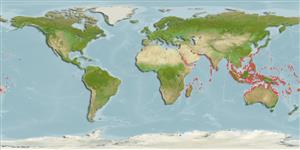Teleostei (teleosts) >
Blenniiformes (Blennies) >
Blenniidae (Combtooth blennies) > Blenniinae
Etymology: Petroscirtes: Latin, petra, -ae = stone + Greek, skirteo = to jump.
More on author: Rüppell.
Environment: milieu / climate zone / depth range / distribution range
Ecology
Marine; reef-associated; depth range 0 - 8 m (Ref. 86942). Tropical; 30°N - 30°S
Indo-Pacific: Red Sea and East Africa to the Phoenix, Samoan and Tongan islands, north to Ryukyu Islands, south to Australia and New Caledonia.
Size / Weight / Age
Maturity: Lm ? range ? - ? cm
Max length : 8.5 cm TL male/unsexed; (Ref. 48636)
Dorsal spines (total): 10 - 11; Dorsal soft rays (total): 14 - 17; Anal spines: 2; Anal soft rays: 14. Head and body speckled and mottled; 5-6 indistinct, dark blotches or bands on body usually with dark-edged ocelli above (Ref. 4404). First three rays of dorsal fin are elevated.
Adults are found solitary or in small groups (Ref. 90102) in shallow protected lagoons and reef flats with algal and seagrass clumps. Juveniles often in floating Sargassum weeds and maybe dispersed over great distances (Ref. 48636). They swim with the tail oriented vertically. Oviparous. Eggs are demersal and adhesive (Ref. 205), and are attached to the substrate via a filamentous, adhesive pad or pedestal (Ref. 94114). Empty mollusk shells are used for nesting. Larvae are planktonic, often found in shallow, coastal waters (Ref. 94114). Captured at the surface using a hand net (Ref. 26165).
Life cycle and mating behavior
Maturities | Reproduction | Spawnings | Egg(s) | Fecundities | Larvae
Oviparous, distinct pairing (Ref. 205).
Myers, R.F., 1991. Micronesian reef fishes. Second Ed. Coral Graphics, Barrigada, Guam. 298 p. (Ref. 1602)
IUCN Red List Status (Ref. 130435)
Threat to humans
Harmless
Human uses
Fisheries: commercial; aquarium: commercial
Tools
Special reports
Download XML
Internet sources
Estimates based on models
Preferred temperature (Ref.
123201): 25 - 29.3, mean 28.4 °C (based on 3369 cells).
Phylogenetic diversity index (Ref.
82804): PD
50 = 0.5005 [Uniqueness, from 0.5 = low to 2.0 = high].
Bayesian length-weight: a=0.00562 (0.00258 - 0.01228), b=3.06 (2.87 - 3.25), in cm total length, based on LWR estimates for this (Sub)family-body shape (Ref.
93245).
Trophic level (Ref.
69278): 2.0 ±0.0 se; based on diet studies.
Resilience (Ref.
120179): High, minimum population doubling time less than 15 months (Preliminary K or Fecundity.).
Fishing Vulnerability (Ref.
59153): Low vulnerability (10 of 100).
Nutrients (Ref.
124155): Calcium = 186 [90, 329] mg/100g; Iron = 0.926 [0.515, 1.667] mg/100g; Protein = 17.9 [16.6, 19.0] %; Omega3 = 0.0796 [, ] g/100g; Selenium = 21.2 [9.9, 49.2] μg/100g; VitaminA = 114 [28, 469] μg/100g; Zinc = 2.83 [1.81, 4.20] mg/100g (wet weight);
